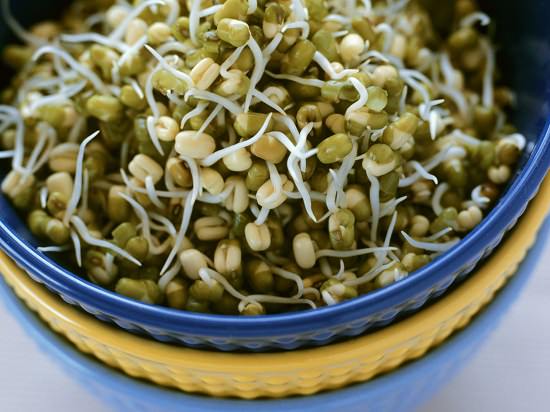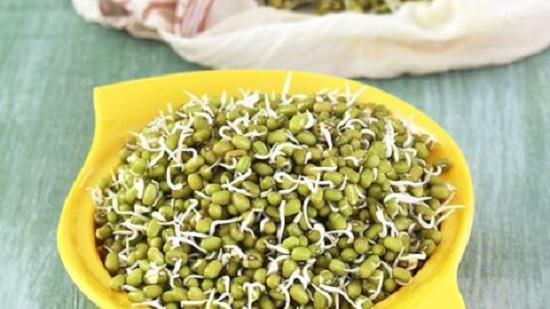Moong sprouts are healthy and easily available across stores. Learn how to use moong sprouts for hypothyroidism and the benefits in this article.
What is Hypothyroidism?
The thyroid is a small butterfly-shaped gland, located at the front of the neck. The gland maintains a high metabolic rate along with other crucial bodily functions via the thyroid hormones T4 (thyroxine) and T3 (tri-iodothyronine).
Hypothyroidism is a condition where the thyroid gland fails to produce enough thyroid hormones. Hypothyroidism affects individuals over 60 years of age and women.
Unexplained tiredness, dry skin, puffy face, noticeable swelling of the gland, constipation, or a hoarse voice are the first signs of hypothyroidism that push patients to seek medical attention.
As the disease progresses, other noticeable symptoms include increased sensitivity to cold, weight gain, joint pain, thinning hair, muscle cramps, depression and heavy or irregular menstrual flow in women. The diagnosis is based on blood tests to evaluate thyroid function.
Causes of Hypothyroidism
1. Auto-Immune
Hashimoto’s thyroiditis is an autoimmune disorder where the malfunctioning immune system attacks the thyroid gland.
2. Hyperthyroidism Treatment
Treating the overactivity of the thyroid gland with radioactive iodine and anti-thyroid medication may also inadvertently lead to hypothyroidism.
3. Surgery
Surgical removal of the thyroid gland can cause a spike in the hypothyroidism condition.
4. Medications
Certain medications like, lithium and mitotane affect thyroid hormone production.
5. Radiation
Radiation therapy that targets cancers in the head and neck can be a leading cause of hypothyroidism. Besides, iodine deficiency can be a possible reason as well.
6. Congenital
Babies are born without a thyroid gland or a defective thyroid gland that can lead to hypothyroidism.
7. Pituitary Gland Damage
The pituitary gland produces the Thyroid Stimulating Hormone (TSH) that modulates the release of hormones by the thyroid gland, and any damage or disorder of the pituitary can lead to hypothyroidism.
Moong Sprouts for Hypothyroidism
Treatment of hypothyroidism is with a synthetic thyroid hormone replacement e.g. levothyroxine.
It is a commonly held belief that adding moong sprouts to the diet can help alleviate symptoms of hypothyroidism.
Moong, Vigna radiata (Mung beans or green gram) is cultivated across Asia for its edible seeds and sprouts. The leguminous plant bears long cylindrical pods that house 7-20 ellipsoid seeds (beans). Most commonly green in color, other varieties of moong vary from brown and yellow to black, with a mottled or ridged surface.
Moong sprouts can be bought directly from stores or also sprouted from the seeds. Soak the seeds in water for 8-12 hours, then rinse, dry and transfer them to a mesh-covered jar or bundle them in a wet muslin or cotton cloth. Place it in a warm dark place away from direct sunlight. The beans will sprout in 1 or 2 days.
Nutritional Value
100g of moong sprouts provides 30 calories; it is a nutrient-rich source of antioxidants, potassium, magnesium calcium, Vitamins A, C, B9, and iron. It is also a good protein source that’s relatively low-cost.
Moong Sprouts For hypothyroidism
When it comes to tackling hypothyroidism, moong, like most beans, provides iodine. The moong sprouts are also a remarkable source of dietary fiber that offers relief from constipation.
While there is a lack of specific research on this subject, nutrient-dense moong sprouts are an excellent addition to a hypothyroidism-friendly diet that aims to offset the implications of a lowered metabolic rate, brought on by the disorder.
How to Consume Moong?
Moong sprouts are frequently eaten raw. They are also a flavorsome add-on to salads, spreads, and smoothies. They are a popular ingredient in soups, fried rice, spring rolls, curries, stir-fry, and other Pan-Asian Cuisines.
Other Health Benefits
1. Reduces Cholesterol
Improves heart health by lowering bad LDL (low-density lipoprotein) cholesterol and also raising levels of good HDL cholesterol (high-density lipoprotein).
2. Antioxidant Properties
The phytonutrients in moong include healthy antioxidants that reduce inflammation and also offer anti-cancer benefits by fighting dangerous free radicals in the body.
3. Helps with Weight Loss
The protein and fiber work to lower blood sugar levels and promote weight loss by curbing appetite and providing a feeling of fullness (satiety).
4. Lowers Blood Pressure
The potassium, magnesium and fiber in moong helps in lowering the blood pressure.




